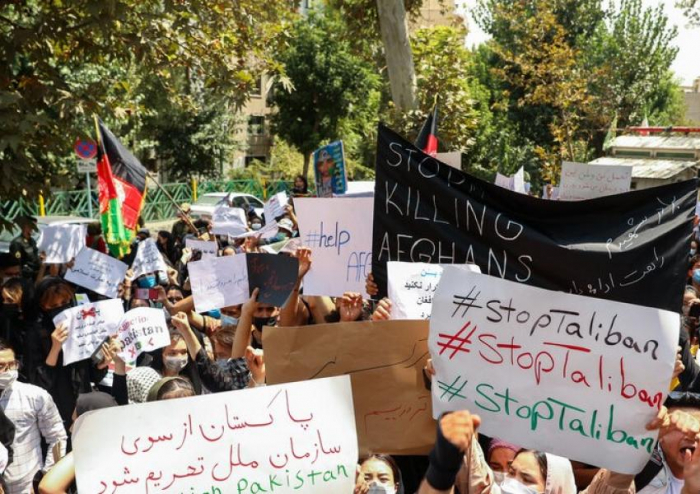Iran Sunday set up camps along its eastern border as the Kabul government collapsed, and hundreds of Afghans living in Iran held a protest rally in front of the United Nations mission in Tehran Sunday against the Taliban. Protesters condemned the return of the Taliban to power and demanded that the UN imposed sanctions on Pakistan for its relationship with the Sunni militant group.
"The Islamic State of the Taliban is the same thing as the Islamic State in Iraq and Syria," one poster held by a protester seen in photos published by the Iranian Students News Agency (ISNA) read. Photos show protesters also holding posters reading "We Don't Want an Islamic State" and "Sanction Pakistan." Another protest by Afghans was reported on Monday in the religious city of Qom.
Many Afghans who live in Iran − both registered refugees and economic migrants − fear for relatives and friends, particularly women, under Taliban rule. Over 1,200 Iranian and Afghan activists in a letter Saturday petitioned the United Nations, the Afghan government, and national and international actors to "undertake responsible measures" for peace in Afghanistan and to protect the interests and rights of its people, particularly women.
FLEEING AFGHANS
Iran said Sunday that the camps it was establishing in three provinces bordering Afghanistan were for temporary refuge. An official of the Iranian interior ministry, Hossein Qasemi, said Sunday that Iran expected refugees to go back to Afghanistan when the situation improved. A new influx will add to the stresses facing an Iranian healthcare system overwhelmed with the Covid-19 pandemic and an economy under United States sanctions.
Taliban spokesman Suhail Shaheen told the BBC(link is external) Monday morning that group was working to form a new government and had ordered its fighters to leave Afghan civilians alone, but many Afghans fear violent practices such as public executions and stonings. The Taliban has ruled out a transitional government, as the government and President Ashraf Ghani had suggested.
Ghani left Kabul Sunday as the Taliban took control of the capital, sending thousands of Afghans including women and children rushing to the city's airport(link is external) in panic. Videos sent to Iran International TV showed people desperately trying to board planes(link is external). While the collapse of the Afghan army and the government(link is external) began with United States President Donald Trump’s deal with the Taliban in 2020, it has accelerated with President Joe Biden’s implementation of Trump’s planned troop withdrawal.
Ghani reportedly arrived in Oman Sunday after Tajikistan denied landing to his plane. The United Nations Security Council holds an emergency meeting Monday morning to discuss the crisis.
Refugees mainly Shia
Iran already hosts millions of Afghan refugees and economic migrants, many of whom were born in Iran. The international monitoring group Acaps says there are 780,000 official Afghan refugees in Iran(link is external) as well as over 2 million unregistered Afghans. According to Iran's 2016 census, Afghans live mostly in Tehran and the north-eastern province of Khorasan Razavi. Most Afghan refugees in Iran are Shiite Hazaras, reflecting the Taliban’s anti-Shiism(link is external).
Some hardliner supporters of the Iran’s government have argued that Tehran must take a pragmatic approach to a group that say has moderated its vehement anti-Shiism. "Taliban rule in Afghanistan meets Iran's national interests better [than the current government] because [it will guarantee] Iran's share from the waters of Helmand, curb drug trafficking and insecurity in Iran's eastern borders, make circumvention of [US] sanctions easier and provided hardworking and cheap workforce for Iran's development," Abdolreza Davari, once a media advisor to former president Mahmoud Ahmadinejad, tweeted(link is external) July 9. Afghan refugees and economic migrants have worked in Iran's agricultural sector and industry for over three decades.
Iran International
More about:
















































